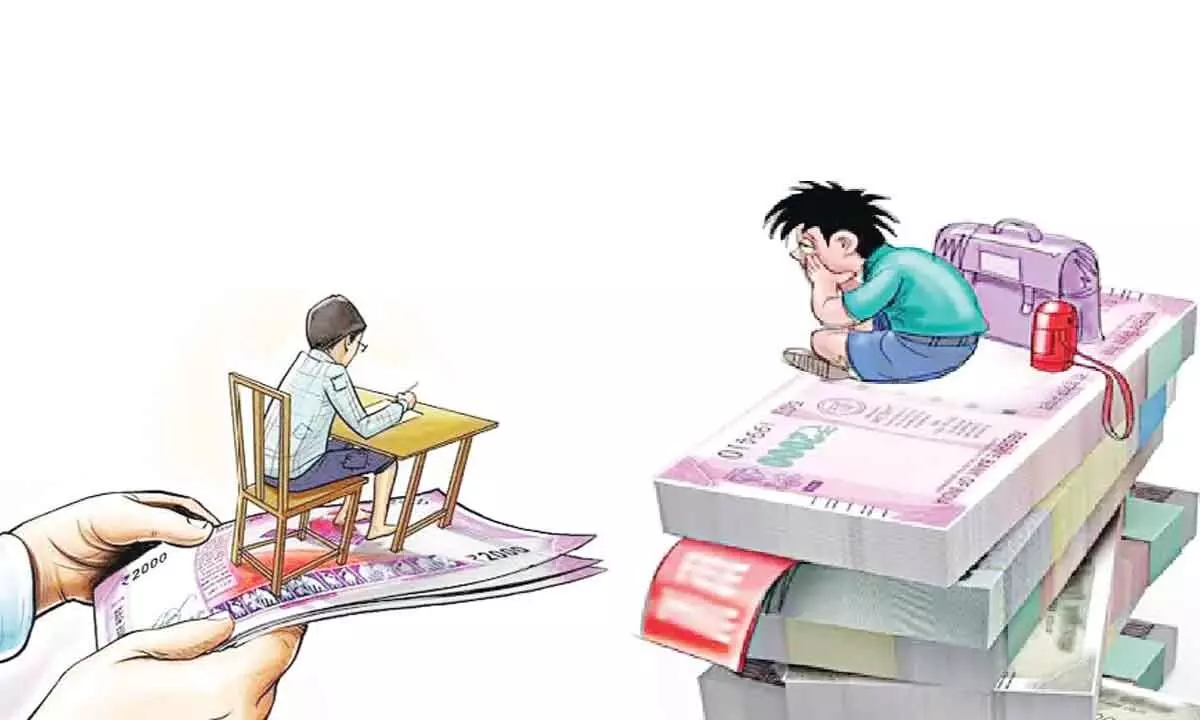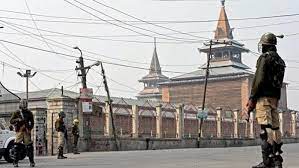Private schools across Kashmir are facing backlash for forcing parents to buy overpriced textbooks—raising serious questions about ethics, transparency, and the commercialization of education.
The Cost of Learning in Kashmir
As schools across Jammu and Kashmir reopen after the annual examinations, a wave of anxiety is sweeping through households. Parents are not celebrating academic progress — instead, they’re losing sleep over the ever-changing teaching patterns, soaring school fees, and the latest controversy: being forced to buy overpriced textbooks from select vendors.
In Srinagar, Baramulla, Anantnag, and other districts, what should be a season of academic renewal has become a season of financial strain and moral outrage.
Education, once seen as the path to empowerment, is increasingly being perceived as a profit-driven enterprise, where transparency has taken a backseat to commercial interests.
The Education Crisis Unfolding in Kashmir
For decades, Kashmir’s private schools have played a vital role in supplementing the government education system. They have brought modern infrastructure, digital learning tools, and improved pedagogy. But in recent years, these very institutions are being accused of turning education into a business — one that prioritizes profit over pupils.
From mandatory purchases of “international” textbook sets costing thousands of rupees to arbitrary shifts in teaching patterns, the complaints are growing louder.
A parent from Gogji Bagh, Srinagar, shared that she paid nearly ₹5,500 for her child’s UKG textbooks from a specific shop recommended by the school. “We had no choice. The school told us the books were only available there,” she said, visibly frustrated.
The story is echoed across the Valley — and it’s not just about money. It’s about ethics, fairness, and the erosion of trust between parents and educational institutions.
Shifting Teaching Patterns: Confusion Over Curriculum
One of the most common grievances among parents is the frequent switching between curriculums — from JKBOSE to CBSE-inspired “Lead App” models or hybrid international systems.
What’s happening:
-
Schools change teaching patterns every year, often without prior notice.
-
Parents must buy new textbooks, even when last year’s books are barely used.
-
Teachers struggle to adjust, leading to inconsistent academic outcomes.
An educator from a South Kashmir private school confided, “These changes rarely come from pedagogical reasoning. They come from management decisions influenced by vendor partnerships.”
Parents say these constant changes are confusing their children. “My son’s school used JK Board books till Class 4, then suddenly switched to a ‘Lead School Pattern’ with foreign publishers. The fees doubled overnight,” said a father from Pulwama.
The result? Academic instability, unnecessary expenses, and eroding faith in the very institutions parents once trusted.
Fee Clearance and Results: The New Power Play
Another widespread concern is the linking of fee clearance to result declaration.
Despite paying monthly fees regularly, parents say schools are now demanding full annual payments before results are released.
In one Srinagar school, parents were reportedly told that their child’s report card would be withheld until the entire year’s tuition, computer, and activity fees were paid.
Educationists argue that this is a violation of educational ethics. “Withholding results for non-payment of annual fees is punitive and demoralizing for students,” said a retired school principal.
Legally, such practices contravene the Right to Education (RTE) spirit, which stresses that no child should be denied academic continuity for financial reasons.
Yet, without effective enforcement, these practices continue unchecked.
Books and Stationery: The Monopoly Market
Perhaps the most controversial issue of all is the forced sale of textbooks and stationery through specific vendors.
Parents allege that schools have created monopolies — directing them to particular shops, often located near the school, to buy “approved” sets of books.
In these stores, the same books often cost 30–50% more than in the open market.
A mother from Rawalpora shared, “We checked the prices at another store, and they were much lower. But the school refused to accept those books, saying they must have a specific cover or stamp.”
This practice, parents claim, is a well-oiled vendor-school nexus, where schools receive commissions or “cuts” in exchange for exclusive business.
The Government Responds: DSEK’s Directive 2025
In January 2025, following widespread complaints, the Directorate of School Education Kashmir (DSEK) finally intervened.
In an official circular, the DSEK directed all private schools to upload their prescribed textbook lists on their websites within three days. The aim was to promote transparency and allow parents to verify which books were approved and where they could be purchased.
The directive explicitly warned schools against:
-
Forcing parents to buy books from specific vendors
-
Using unapproved curricula
-
Revising fees without prior consent of the Fee Fixation and Regulation Committee (FFRC)
A senior DSEK official said, “No school has the right to compel parents to buy textbooks from particular shops. Any such act is a violation and will invite action.”
However, implementation remains weak. Many schools have yet to comply fully, and enforcement agencies are struggling to monitor every institution.
The Ethical Question: When Education Becomes Commerce
The Kashmir textbook crisis raises deeper moral questions.
Is education being commodified?
Are private schools prioritizing vendor contracts and profit margins over a child’s right to affordable learning?
Parents see the issue as part of a larger culture of exploitation. “Education has become a money-minting industry,” said one parent during a protest outside a Srinagar school. “We are paying for everything — from activity fees to smart class fees — and now for books that cost more than our salaries can bear.”
Experts say this commodification reflects a systemic failure in regulation. The absence of strong, enforceable checks has emboldened schools to operate with impunity.
Fee Hikes: The Silent Inflation
Even as inflation grips the economy, private schools in Kashmir continue to revise fees unpredictably.
Parents report that annual tuition and transport charges are being hiked mid-session, often under vague labels like “development fund” or “technology upgrade”.
In theory, every fee change must be approved by the Fee Fixation and Regulation Committee (FFRC) — but in practice, schools often proceed without approval.
The FFRC, led by a retired High Court judge, has warned schools against unilateral hikes. Yet, without timely inspections or strict penalties, violations persist.
A 2024 survey by a local education rights group found that average annual school costs in Kashmir’s private sector have increased by 37% since 2019, outpacing income growth for most families.
The Emotional and Social Toll on Families
Beyond financial strain lies the emotional exhaustion of parents and children.
Mothers describe staying awake at night, calculating expenses, worrying about fee deadlines, and negotiating with school administrators. Fathers speak of sacrificing essentials to meet rising educational demands.
Children, too, are affected. Constant syllabus changes, financial stress at home, and the sense of being part of a system that values money over merit have left many feeling demotivated.
Psychologists in Srinagar report an increase in anxiety and academic burnout among students — symptoms of an education system that has lost its balance between learning and commerce.
Root Causes: Why This Keeps Happening
-
Weak Enforcement:
DSEK and FFRC directives are often reactive, not preventive. Without sustained monitoring, schools return to exploitative practices. -
Lack of Transparency:
Many schools fail to disclose textbook publishers, vendor contracts, or fee breakdowns. -
Parental Powerlessness:
Parents fear reprisals against their children if they question management decisions. -
Absence of a Unified Policy:
Jammu and Kashmir lacks a single, enforceable private school policy with teeth strong enough to ensure compliance.
What Parents Are Demanding
Parents’ associations across districts are now mobilizing and articulating their demands clearly:
-
Transparent Fee Structures with no hidden charges
-
Freedom to Choose Bookstores and vendors
-
Stable Curriculum aligned with JKBOSE or CBSE, not hybrid experiments
-
No Withholding of Results due to fee disputes
-
Government Monitoring Committees including parent representatives
These are not radical demands — they are the bare minimum for ethical education.
The Way Forward: Reforms That Can Work
1. Mandatory Public Disclosure
Every school should be required to publish its full booklist, fee structure, and vendor agreements on its website.
2. Parent-School Oversight Boards
Independent boards with parent representation can review curriculum changes and financial decisions.
3. Digital Complaint Portals
DSEK and FFRC can introduce online dashboards where parents can log verified grievances.
4. Textbook Price Audits
Annual audits comparing school-prescribed book prices to open market rates can expose profiteering.
5. Promotion of NCERT and JKBOSE Texts
At foundational levels, affordable government-approved textbooks should be prioritized.
Education as a Right, Not a Revenue Stream
The moral of Kashmir’s textbook crisis goes beyond policy and prices. It’s about reclaiming the soul of education.
When schools become marketplaces, children become commodities, and parents become customers — the purpose of learning collapses.
Education should be a public trust, not a private transaction.
As Kashmir rebuilds its social and economic systems, restoring integrity in education must be a collective priority. The government must act decisively, schools must self-regulate ethically, and parents must continue to demand accountability.
Only then can we ensure that the next academic session brings learning — not lamentation.


